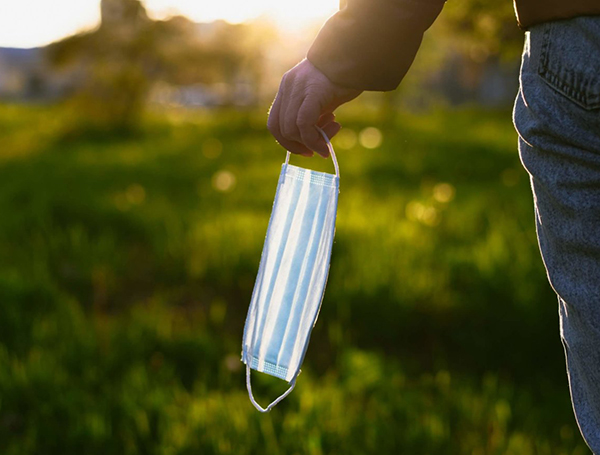 S2K Commerce - Products Dropdown
S2K Commerce - Products Dropdown
 Web Content Viewer - Blog
Web Content Viewer - Blog
How to Dispose of Used Dental Masks: Finding a Better Way

More than ever, the environment is among our primary concerns. However, since the outbreak of the COVID-19 pandemic, many of us have felt compelled to set aside our eco-friendly habits in favor of our health and that of our loved ones. Unfortunately, widespread use of single-use personal protective equipment (PPE) has created significant environmental challenges. One need only think of the used masks seen daily on the roadside, a symbol not only of the ongoing pandemic, but also of the pollution caused by poor waste management.
As a manufacturer and distributor of PPE, Medicom is very sensitive to environmental issues. Our team is continually looking for sustainable solutions. However, while we wait for new processes and more eco-responsible raw materials to prove their effectiveness, we wanted to address the subject more globally to answer some of the most frequently asked questions. To that end, we have summarized our view of the current situation, as well as some important tips. After reading this article, you will be better equipped to make a difference by making small changes to your habits.
Used mask waste management
Before sharing some of the best ways to dispose of used masks, it is important to understand what raw materials are used to manufacture them.
Masks are usually made of plastic and aluminum derivatives. Specifically:
- Mask and respirators filters, as well as the inner and outer layers, are made from polypropylene.
- The elastic earloops are made from a blend of polyester and Spandex.
- The nose piece is made from aluminum or iron covered with plastic.
Knowing that plastic and aluminum are generally recyclable, one might assume that masks can easily be recycled. However, that is not the case. Unfortunately, the plastic used to make masks, polypropylene, is different from typical packaging plastic. Polypropylene, a N.5 plastic, cannot be recycled at home. Furthermore, used masks and respirators can be biohazardous once they are contaminated by splashes, sprays and respiratory secretions.
The aluminum, or iron, that is used to make the nose piece is fully recyclable. However, to be able to recycle it, a machine that deconstructs the mask and isolates the aluminum is required. Although these machines exist, the process is complex and expensive. For these reasons, the vast majority of masks end up in landfills.
However, there are alternatives to sending used masks to landfills. In fact, some healthcare facilities, schools and other industries are using methods that apply some of the principles of the circular economy. However, these methods are expensive and require additional internal resources. Fortunately, various groups are mobilizing and analyzing different options that could make waste management more accessible with respect to PPE of all kinds.
Safer disposal of PPE
Effective masks come with an undeniable ecological cost, but we can all do our part to limit their environmental impact. Here are some tips you can use today to help keep masks off the streets:
- The best way to dispose of your used masks is to accumulate them in a clean, resealable bag BEFORE putting them in the trash. Always wash or disinfect your hands after handling used masks.
- Do NOT dispose of masks in your home recycling or compost bin.
- Cutting the elastic earloops on masks before disposal will reduce the risk of an animal becoming entrapped. Elastic earloops can also injure their feet/paws, necks or wings if the mask gets caught on something. Always wash or disinfect your hands after handling used masks.
- Avoid throwing your masks in public garbage cans that tend to overflow and are not protected from the wind. Ideally, you should keep your used masks and dispose of them either at home or in a garbage can that seals properly.
- If you are concerned about your consumption of single-use PPE, you can also purchase carbon offsets to reduce GHGs and fight climate change. More information about this initiative is available in this New York Times’ article.
If you want to become even more involved in this cause, you can also discuss with your employer, your elected officials and your schools the possibility of using a company that specializes in PPE recovery. These companies provide cardboard recycling boxes and when they are full, collect the contents for recovery or recycling.
FOR MORE INFORMATION ABOUT PPE, READ OUR BLOG ARTICLE: COMMON BELIEFS ABOUT PPE: DEBUNKING THE MYTHS
Can single-use masks be washed?
Unfortunately, single-use masks were not designed to be washed. In fact, it is recommended that they be discarded as soon as they become wet, since moisture reduces their filtration capacity.[1]
Medicom is doing its part
As mentioned earlier, the team at Medicom is determined to be part of the solution. Our research and development team is currently working on future generations of masks and our new plant, Meltech, will provide a unique R&D center where we can develop innovative personal protective equipment and push the limits of possibility.
In addition, we use offsetting efforts to fulfill our environmental responsibilities. We support organizations such as One Tree Planted, a non-profit organization dedicated to global reforestation.
READ OUR PRESS RELEASE ABOUT OUR PARTNERSHIP WITH ONE TREE PLANTED

Clearly, there is no simple and immediate solution for managing used PPE. However, companies like Medicom are aware of and sensitive to the environmental impact of single-use products. As you read this article, multiple actors are collaborating to find eco-responsible solutions as quickly as possible.
Although existing options are limited, it is important to remember that our small daily gestures and our collective reflections can make a real difference when it comes to protecting our environment.
References
[1] https://www.protegez-vous.ca/nouvelles/sante-et-alimentation/peut-on-laver-ses-masques-chirurgicaux